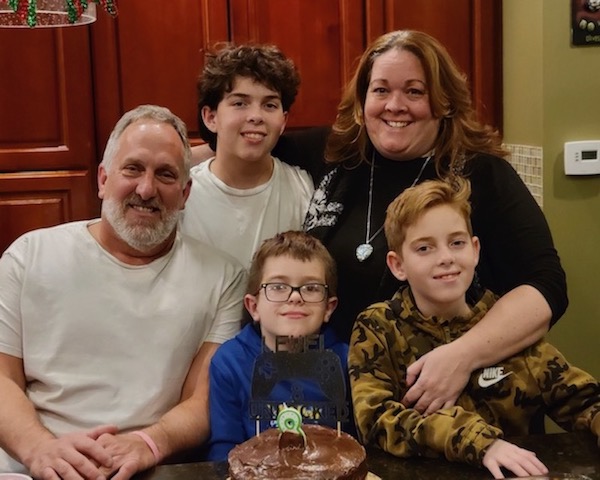
MILL BASIN — Donna Incorvaia grew up in a Catholic home where religion was part of her everyday life. She is now doing her best to pass her faith down to her three sons, explaining: “I want them to have a solid foundation to guide them in life.”
One of the ways she is doing that is by having her boys attend faith formation classes at the family’s church, St. Bernard of Clairvaux in Mill Basin. Faith formation is one of the key ways parents share their religion with children because it is through faith formation that youngsters prepare for the sacraments of Communion and confirmation.
Incorvaia’s son Peter, 15, completed the faith formation program. His siblings — Ryan, 11, and Christopher, 8 — are currently taking classes.
But people like Incorvaia are becoming rare if the findings of a Pew Research Center survey are to be believed. The poll, released in January, found that only 35% of Catholic parents in the U.S. believe it’s extremely important that their children belong to the same religion.
By contrast, 70% of evangelical Christians believe in passing their faith on to their kids. Only 29% of nonevangelical Protestants cited it as important. The researchers asked Americans of many religions, including Jews, Muslims, Buddhists, and Hindus, the survey questions. Those results were not included because the researchers could not obtain enough respondents.
Incorvaia, a public school teacher, was surprised by the findings.
“It’s upsetting, and I’m sad, too, to hear that,” she said. “When I was growing up, religion was a very big part of our lives — for my mother especially. And she instilled that in me.”
Incorvaia demonstrates her commitment not only by enrolling her children in faith formation class but by serving as a catechist at her church.
If she is bucking a nationwide trend, so be it, she said. “I believe very strongly in teaching kids the faith,” she added.
The Pew results contribute to a portrait of an America that is increasingly secular.
An earlier survey found that approximately 29% of Americans are “nones,” people unaffiliated with any organized religion. That’s almost double from 2008 when it was 15%.
And since 2010, 39% of marriages performed in the U.S. have been between interfaith couples. For some of these couples, there is a reluctance to bring their children into one faith. Instead, many parents say they prefer to leave it up to their children to decide on religion when they grow up.
That type of indecision among Catholics is a shame, said Christian Rada, director of marriage, family formation, and respect life education for the Diocese of Brooklyn, who said the Church teaches that the parent is the first and most important teacher of the faith.
“In the sacrament of marriage, the bride and the groom make a promise that they’re going to raise their kids in the faith. At baptism, they’re instructed that bringing the baby into the faith doesn’t end with baptism. It’s just the beginning,” he added.
Father Joseph Gibino, vicar for evangelization and catechesis for the Diocese of Brooklyn, wasn’t surprised by the Pew survey. “I wish I could say that the poll is wrong. But it’s not,” he said.
“What we are discovering is that everything is more important to parents than faith formation — dance, soccer, baseball, you name it,” Father Gibino said. “All of this reflects national trends, and our diocese is no different.”
He cited one unnamed parish that had a thriving faith formation program 10 years ago but had to scrap it this year because only 25 children signed up. The students had to enroll in classes in nearby churches.
However, there are bright spots — parishes with strong faith formation numbers, Father Gibino said. “Oh, absolutely, there are parishes that are thriving,” he added.
St. Bernard of Clairvaux, which currently has an enrollment of 250 children, is one example. “I think that we’re very lucky because we do have a lot of parents who are very interested in having their children be a part of the faith formation program,” said Melissa Wagner, director of religious education.
Jeannine Turnbull, a catechist there, said the parents she encounters are fully engaged. “When the parents come to pick their children up, I hear them ask, ‘What did you learn today?’ They’re curious as to what’s going on in class, which is a positive sign,” she said.
Wagner believes classes bring families closer in faith. “The children are going home after class and telling their parents what they’re learning. And then they discuss it as a family,” she said.
Rada sees some positive signs for the future. As an example, he cited the fact that while parents might not be fully on board with passing on the faith to their children, other relatives are stepping in to fill the gap.
“In my experience as a faith formation director, it was grandma and grandpa that would be the ones to bring the children to religious education. They were the ones that wanted religion to be part of the child’s life,” he said.
One way to help parents become more involved is to encourage them to attend Mass with their children, Rada said. “Families need to be provided opportunities to grow in their faith together. Going to church and having a church environment helps out with the witnessing of the faith,” he said, adding that at least 50% of people who attended Mass with their parents as children stay in the faith as adults.
Meanwhile, religious leaders around the country are absorbing the results of the Pew poll.
“I think the strength of this survey is that it shows we need to rethink our faith formation programs and reimagine them as family formation programs,” Father Gibino said.
“We’ve used the classroom model that is no longer working. And we need to move to an evangelization model where we are forming intentional disciples. And that intentional discipleship has to come from within the family.”
